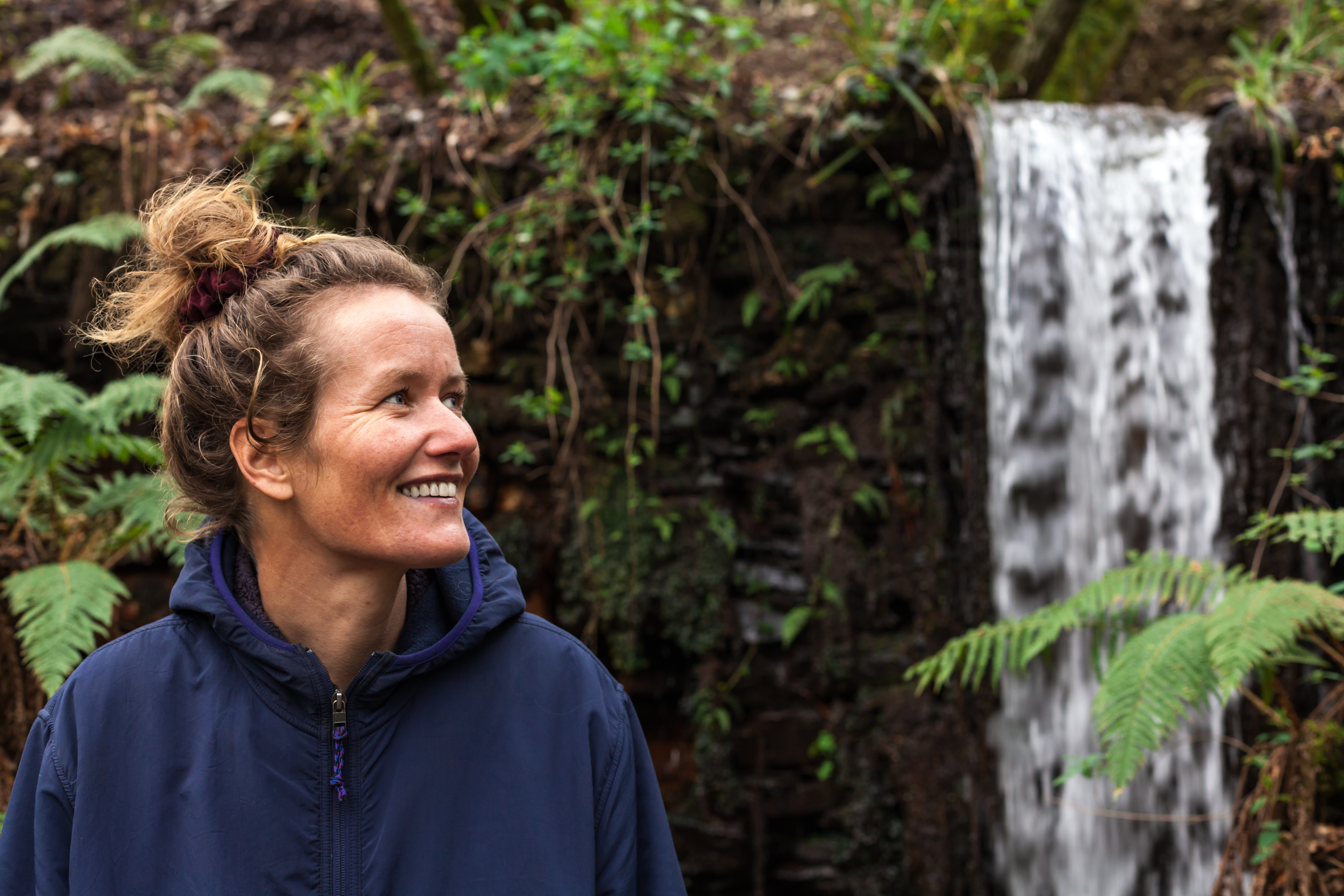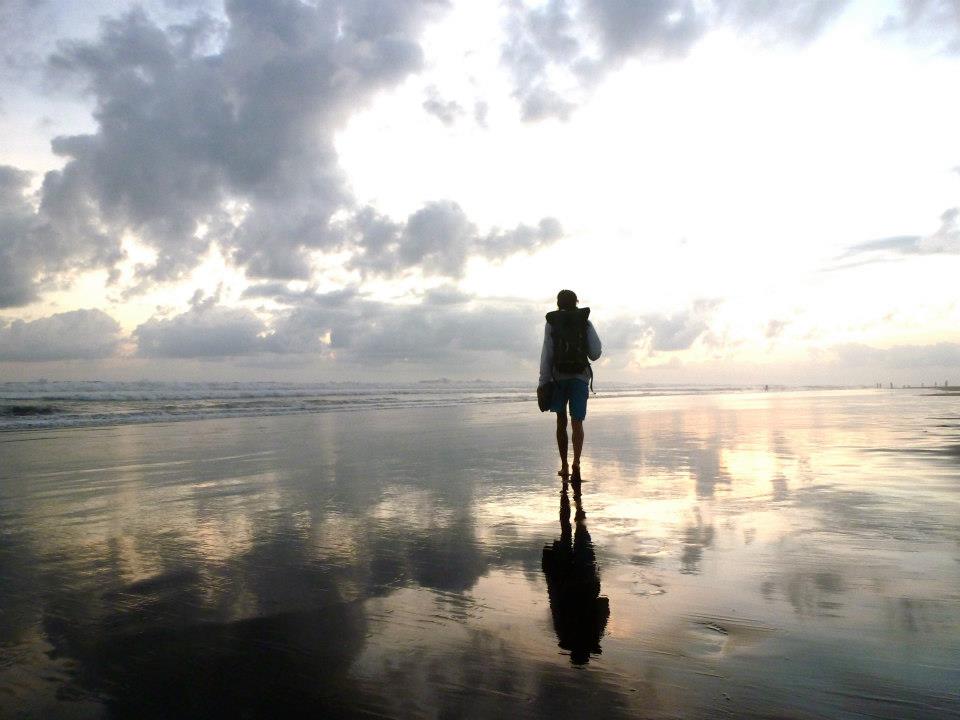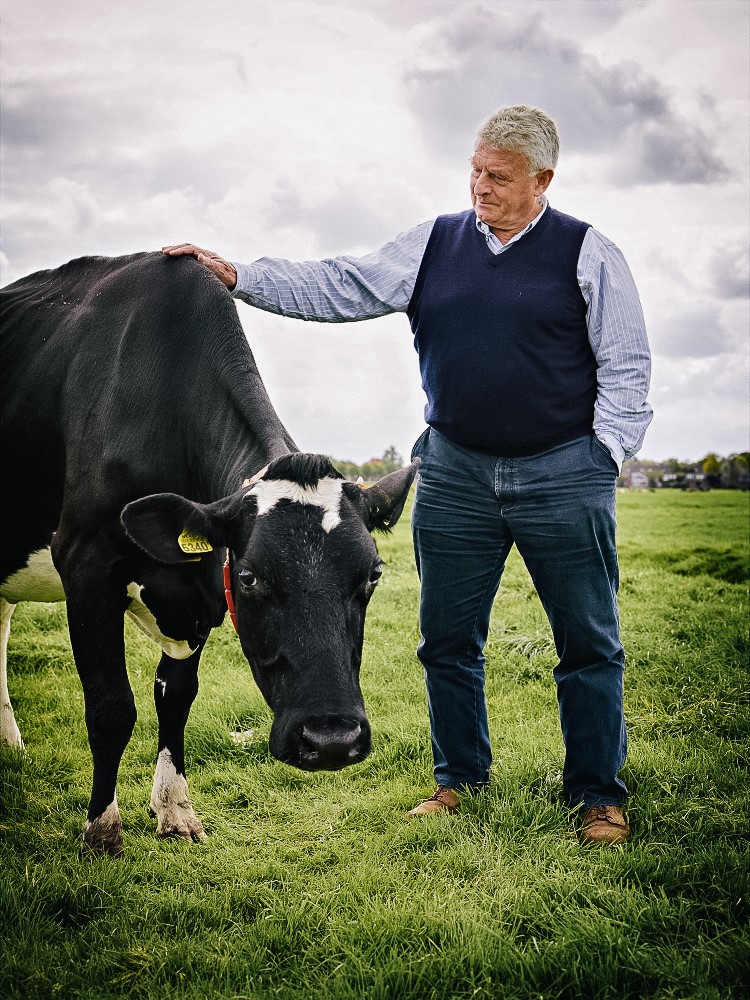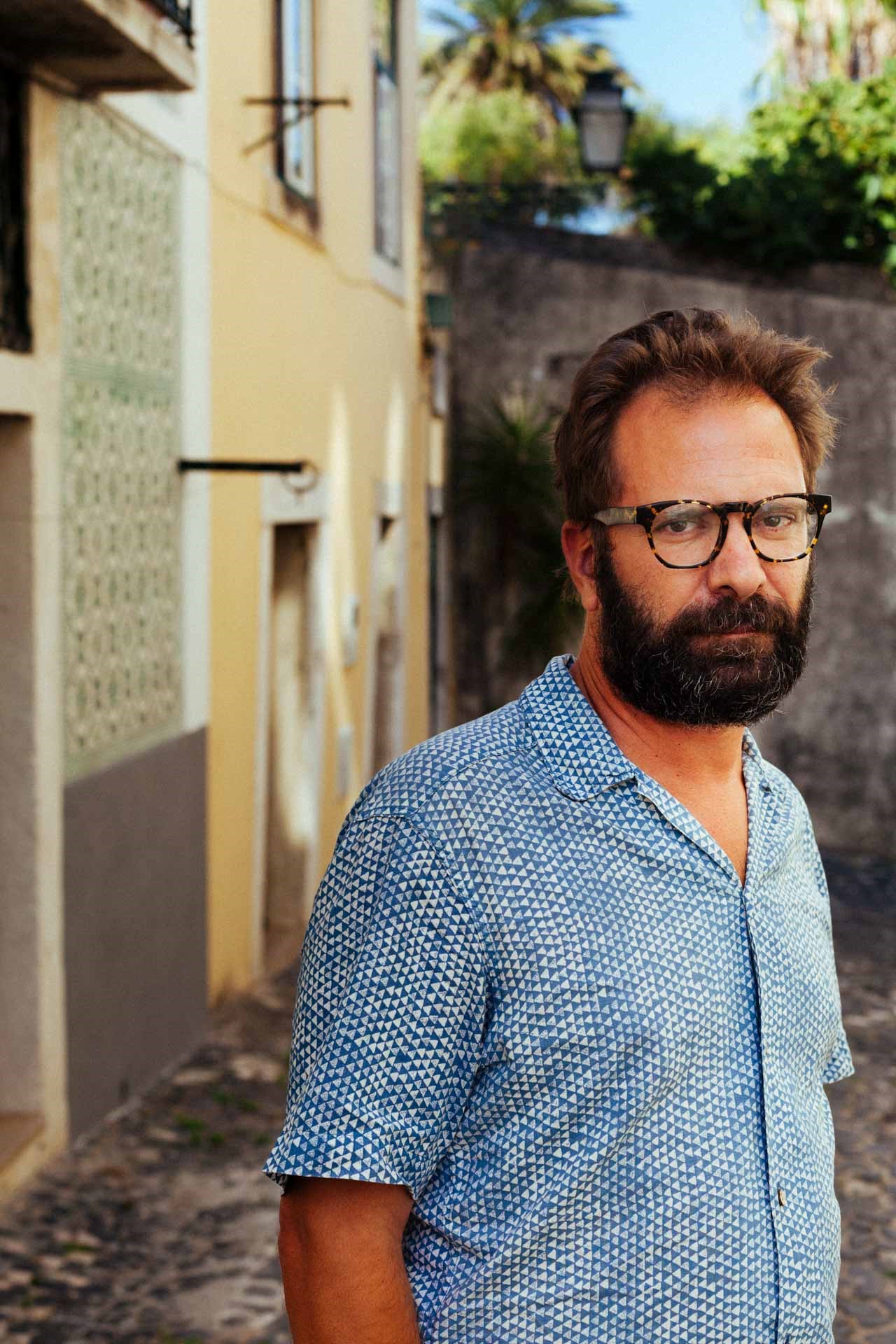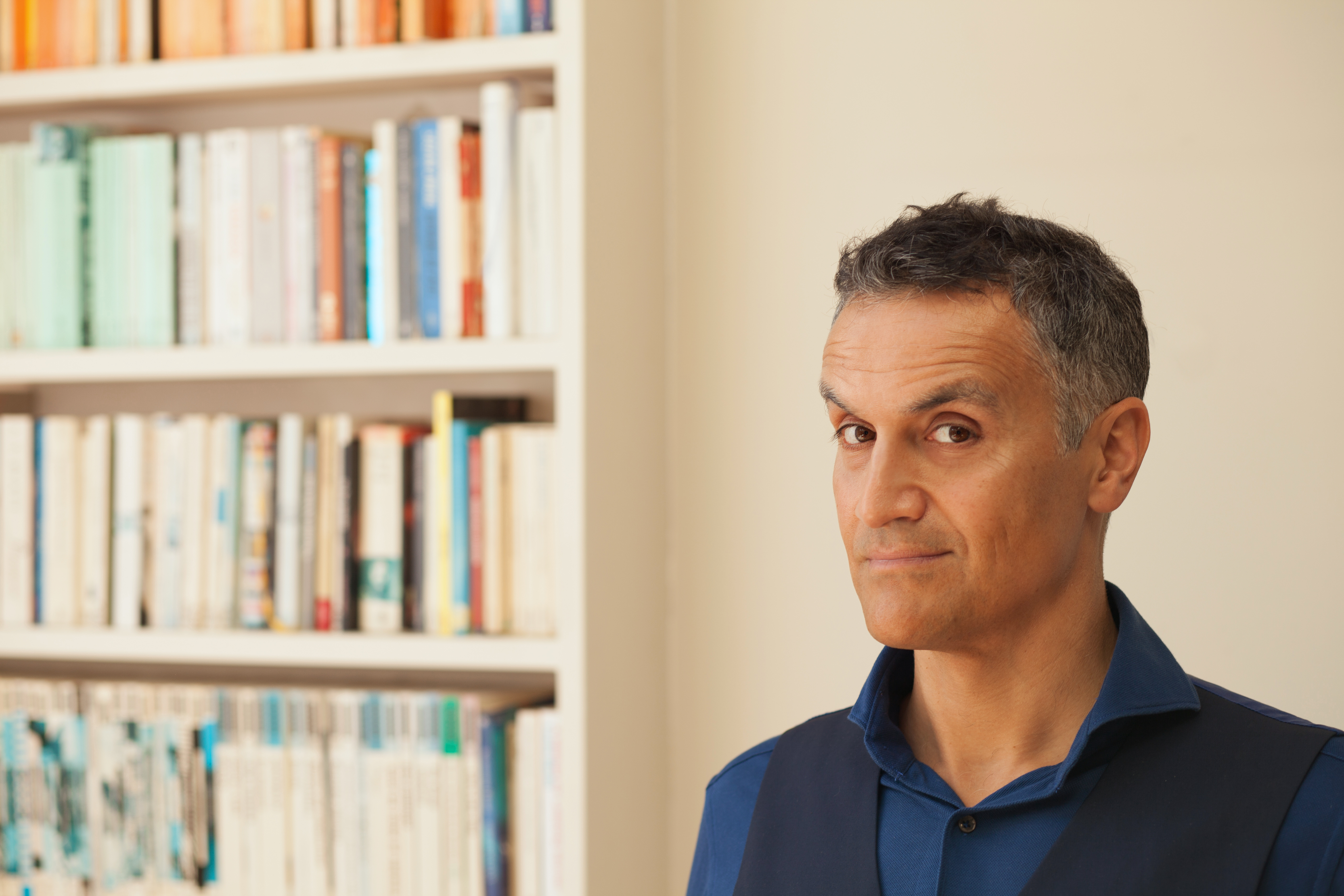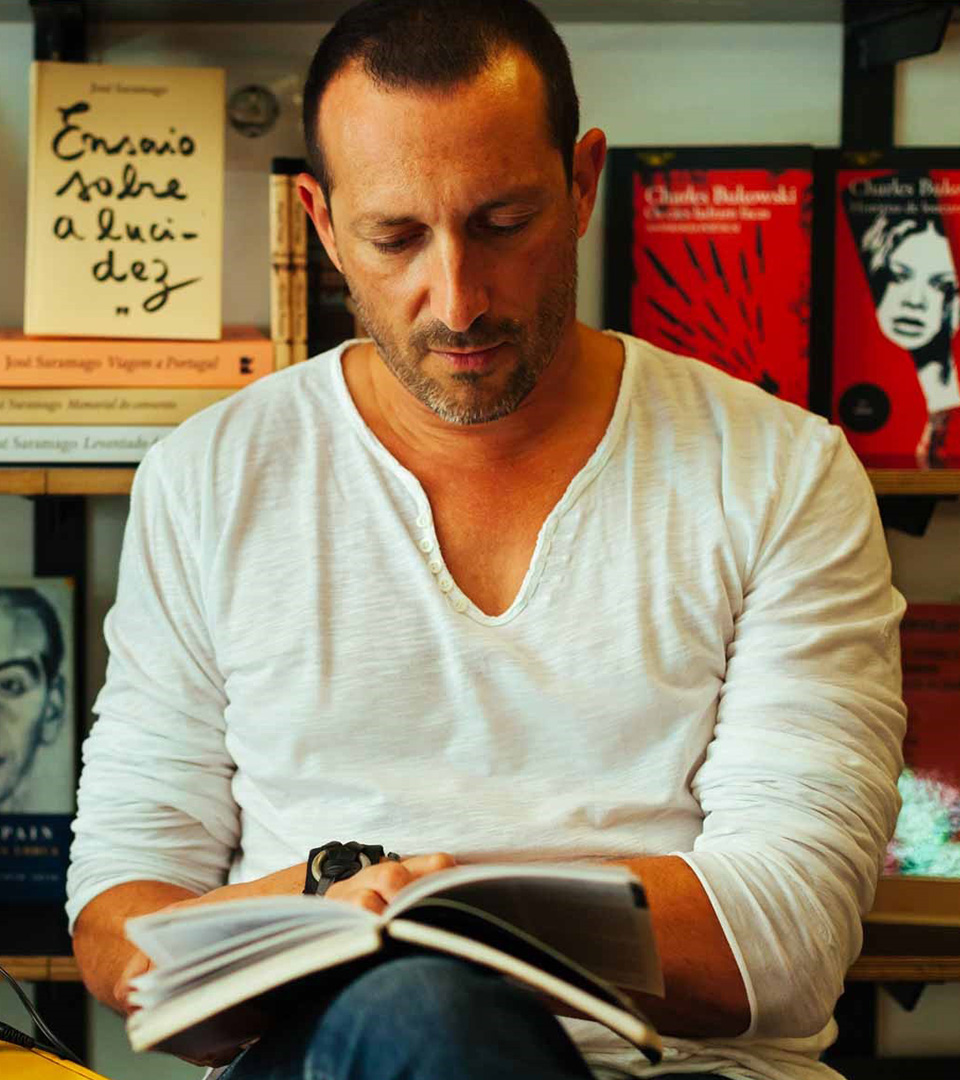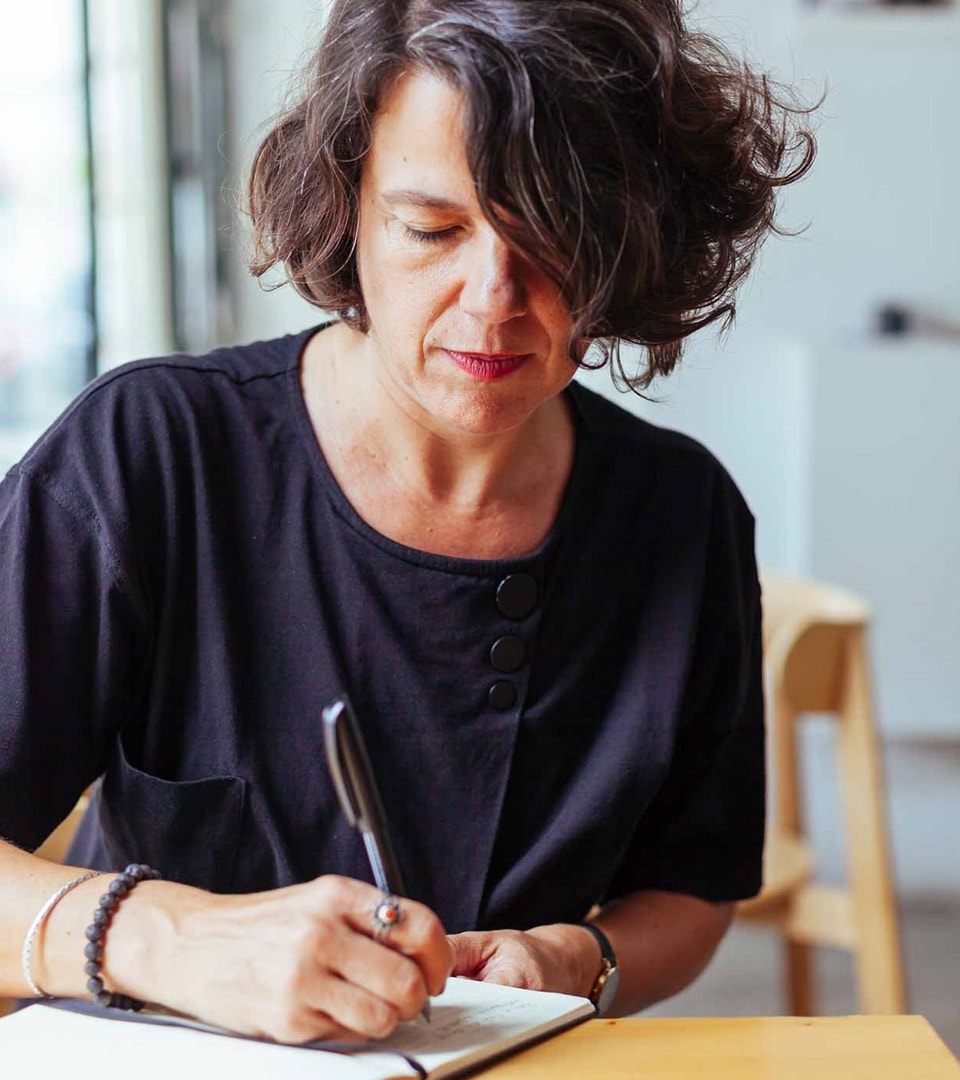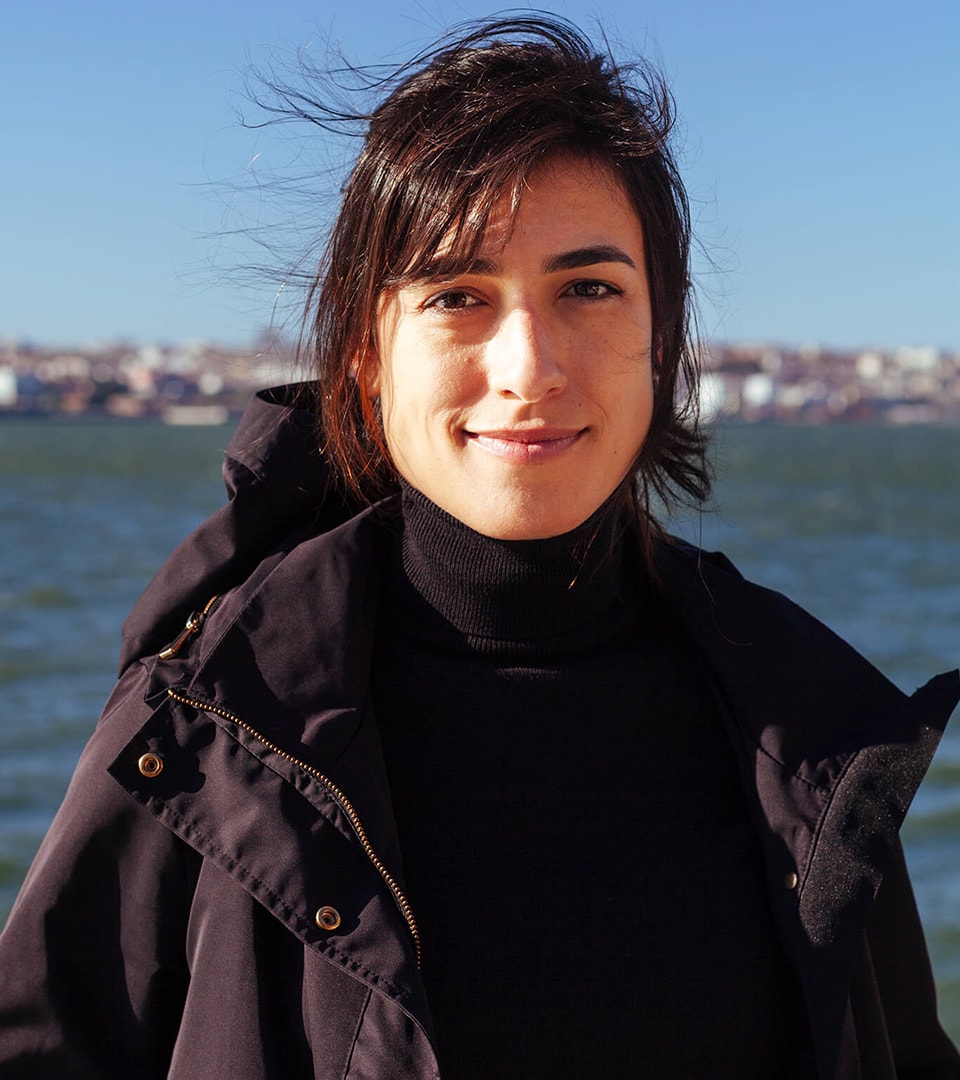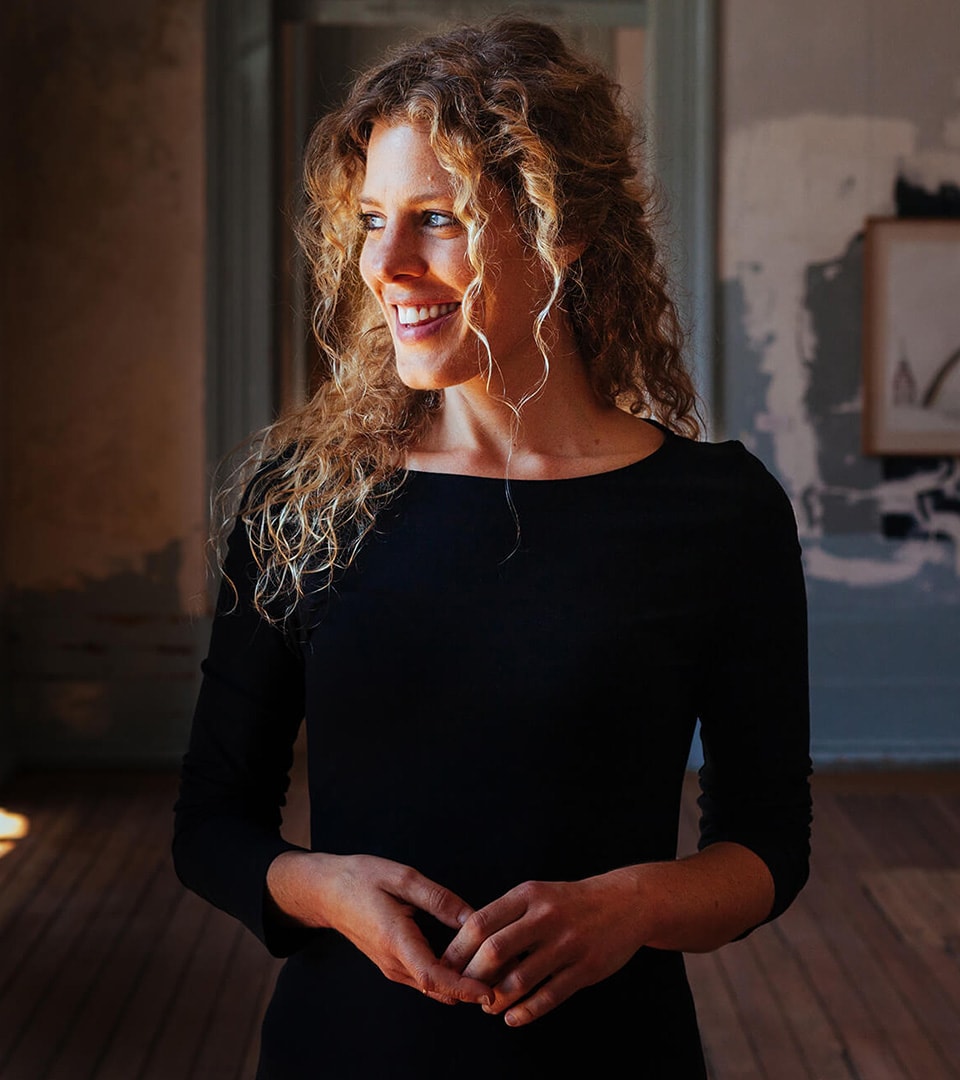DennisStorm
The former TV personality who became a full time minimalist
Dennis Storm was once the host of a famous Dutch TV show, more recently he wrote a book about the beauty of minimalism and loves to build. He lives together with his girlfriend and two kids in 22 ㎡, spending time on things that truly matter to him.
We met him to talk about the ideal world regarding his minimalist ideas. It became a maximalist interview. “We miss a collective goal, while it’s right there in front of us. We don’t want to see it.”
"The problem is not just the big companies who have set everything up, it’s also with us. If we need a new shirt, we buy eight."
"We just have to stop buying, but we have nothing to do so we are constantly looking to fill up that emptiness."
"Although the bigger collective goal – getting green – is there for the taking, we don’t embrace it massively."
"Everyone’s screaming that we need change, but few people are really doing something about it. They don’t feel the urge, but that will become clear by itself. The only question is when."
"We are way too comfortable here; when it’s not strawberry season, we still want strawberries. I suggest we eat what comes out of the soil here."
"We think we need to get everything out of life all the time."
"If you ask them about their hobbies, they don’t have time for them. While actually that hobby is maybe the answer to feeling better. "
"If everything can be destroyed in a day, everything can also be changed."
When did you decide to work less and focus on other things? “I didn’t want to work less, I wanted to work less for money. I liked the travel program I presented, but not presenting itself. Because of that, I wasn’t a good example for my kids. When they grow up I want them to do something that excites them, with the right intentions. If you have that mindset, you have to start with yourself.”
Many people see your previous job as the ideal one. Did that put pressure on you? “No, but funnily enough there are so many misconceptions about that kind of work. People working in the media don’t all live in Amsterdam and hang out in the same bars. Not all of them earn loads of money and get driven to work in a limousine. If a bookkeeper doesn’t enjoy his work anymore and starts to do something else, no one would be the wiser. In my case, there were people, also those close to me, who did not understand that I wanted to take distance from such an admired position. Being a presenter is a sort of holy grail, but I never saw my old work like that. A lot of people didn’t know that other things kept me busy during my time as a presenter, they never asked about it, it was always about the damn television. I found that so weird.”
Let me ask the question then: what keeps you busy? “I work as something like a contractor, I furnish houses and I write. When I’m bored, I like to rebuild things which is why I have always had my own workspace. I wanted to downsize, so I built a tiny house in the forest near the sea (in the Netherlands). Half of the year we live there with just 22 ㎡, the other half of the year we live in Bali with 25 ㎡.”
That’s really tiny. How do you decide what you can own? “I do that with a sound mind. In total, I have one suitcase of belongings, but I won’t say that the people around me do or should do that.”
Does being minimal mean to you that everything is also tidy? “Tidying up has nothing to do with minimalism. Marie Kondo neither. If you do it well, it’s a single event that goes hand in hand with waving goodbye to your shopping addiction. It’s more about decluttering. However, I can’t deny that if you furnish your house in a smart way and you don’t own too much, you never really have to tidy up. You only have to put things back in their place, which provides peace.”
Are all your belongings sustainable? “No, but naturally I think about it a lot. Where it goes completely wrong between green ideas and minimalism, is that everything has to be perfect. In Amsterdam, there are a lot of clothing stores where they make fabric from recycled material and old fishnets. All these new brands are bashing on H&M and Ikea, but in the meantime, they’re setting up their own local businesses inviting us to shop till we drop again. The problem is not just the big companies who have set everything up, it’s also with us. If we need a new shirt, we buy eight.”
I immediately think about the surplus of cotton tote bags on my coat rack. How bad is that? “There are enough cotton bags you can make 10.000 plastic bags out. In reality, we are done with those cotton bags after three months because the text on it doesn’t appeal to us anymore. So it’s way better to stuff a strong plastic bag with belongings and use it for three months. The same problem is happening with water bottles made from steel, but break easily. You can also make them from plastic, that’s less fragile. But no! We don’t do that because plastic is bad. The ironic thing is that especially the extremists who visit green festivals think it’s better to buy a cotton bag and steel water bottle. That’s great, but only if you use them for years.”
As far as I understand, there are many misconceptions about what’s green and what isn’t… “Don’t get me started! Never has a newspaper properly explained how we can feed the whole world with just the food we give to our cows. If we would do that, hunger would be solved. To add something to that: people got mad at me because I published my book on paper. In their opinion, I should have published it electronically. What they forget, or more likely are unaware of, is that you have to read 40 books a year for eight years to break even in terms of the environment. And that doesn’t even touch on all those forgotten e-readers, neglected Christmas presents, gathering dust in cupboards somewhere. In Dutch we have a saying, ‘daar valt niet tegenop te lezen’. You can interpret that as ‘you can’t read enough to beat that’. A lot of supposedly super sustainable ideas are so much less sustainable than we imagine. We just have to stop buying, but we have nothing to do so we are constantly looking to fill up that emptiness. Look at all that pure boredom on Instagram, that says it all don’t you think?”
We have nothing to do, but at the same time, everyone is busy. How’s that possible? “We’re missing a collective goal. In earlier periods we always had one; Regeneration after the First and Second World Wars. Celebrating freedom in the sixties. Fighting AIDS. Protesting against the Cold War. Although the bigger collective goal – getting green – is there for the taking, we don’t embrace it massively. I would prefer to see how we bring the earth further in a green way, that companies shift to the green side and that we fight for something. But people are afraid to make concessions. Everyone’s screaming that we need change, but few people are really doing something about it. They don’t feel the urge, but that will become clear by itself. The only question is when.”
Are you so aware of climate change because of your many travels? “I’ve never actually been to a place in the world where it became so clear. Well, I was once in a desert that was previously a forest, but I’m not sure if that was a result of climate change or a natural process. I have read a lot and seen many documentaries about it. It’s a pity all those documentaries are only broadcast by public television at night. At that time, only people who are already interested and up to date watch them. It would be better to engage the people who switch off after the easy entertainment shows are over.”
How can we make sure people who are not up to date will get up to speed without pointing a finger? “I think it’s going to take ages before we catch them, and also, it’s just not that simple. Most of the time people are for or against going green. We like to see the world as black or white, but I prefer to see the world in grey. It’s good to keep in mind that the balanced way we profit from our planet is gone. If you would have met with the whole of the Netherlands 50 years ago and proposed: ‘We should get rid of all those little farms, let’s make one gigantic farm owned by one farmer. All those other farmers should look for new jobs or work for that big farm. We should stop with one-year potatoes and the other year cauliflower, we’re only going to farm one crop because if we put enough poison on it, it will work perfectly. Oh, and we’re going to construct mega meat factories also we can produce big amounts and sell for little money in supermarkets. This means we’re also getting rid of those small butchers…’ If you would have suggested this idea to people back then, nobody would have cooperated. Yet it’s our reality. We can acknowledge that we made a mistake, but it’s up to companies and governments to intervene. And of course, lots of
people are against that. We can wait until everyone is on the same page, but that’s never going to happen.”
Do you believe governments can really change something? “I think the solution is mainly in business. They are the frontrunners, politics will follow after. Sadly, the only thing that really speaks in business is money and not the will to create a healthy future for your grandchildren.”
Are there companies that are already doing it right? “For many companies, it’s only about marketing and their image. They claim things they don’t live up to and color their logo green. Instead of that, it would be fantastic if Miele, Siemens and Philips adopt a lending culture, so consumers can rent rather than buy their machines. The standard is that when one brand invents something, the other will come with an even more amazing something. But if you want to make something that lasts a long time, you’ll choose a sustainable design made of decent materials. The last thing companies want is having to hire an expensive mechanic to fix all the defects.”
Is there a country you’ve visited during your trips that made you think: ‘this is how we should do it?’ “A few years ago I was in Albania, an upcoming country. What I saw there is that they build everything more sustainably because they’re starting from the beginning. They have automatic garbage separation systems – funnily enough, from the Netherlands. We, on the contrary, work with complicated systems and have to separate our rubbish at home because we’re tied to all kinds of companies and contracts.”
How do we get rid of this complicated system? “I think we have to put more effort in from the start. We’re not going to make it happen that everyone in the Netherlands starts to recycle. In fact, we can’t even make it happen that one out of four will do that. Therefore, we need to
create a system where (conscious) recycling is not even necessary. And ultimately, just nine percent of what we deposit will actually be recycled. In other words: we put too much energy into something with such a small outcome.”
I thought all that packaging kept our food fresher for longer… “I think farmers should come to the supermarkets with crates full of fruit and
vegetables instead of all those teenagers stacking shelves. That would also make it much easier to buy one apple and three bananas, thus less waste. Furthermore, I find it a very weird system that a tremendous amount of what we produce here is exported, while at the same time, we import fruit and vegetables from Asia, South America and Africa. It comes here pre-packaged, by plane or boat, explain that one for me! We are way too comfortable here; when it’s not strawberry season, we still want strawberries. I suggest we eat what comes out of the soil here. In times of hunger and war people eat everything. We seem to forget we’re also in an emergency right now.”
Do you think things have to get worse before they get better? “I don’t think so, but it might be the only way to turn the tide. If you read about plastics, most of the time amounts are mentioned that nobody understands. If you make it smaller, say a turtle with a plastic straw stuck up its nose or a dolphin caught in fishnets, it touches you more. It seems like only then do people conclude they have to change their lifestyle somehow.”
You’ve made a choice to only buy the things you really need. How do you deal with people who want to give you or your kids presents? “It doesn’t happen that much anymore. We always put it on the invitation to let people know we don’t want anything. With the family, we buy one present together. Funnily enough, kids are most happy with the cheapest or simplest presents, a stick from the forest or just playing outside. Furthermore, so much research proves that having fewer toys is way better for the development of a child than having many. Yet nobody listens to that, I don’t understand that. If I read about the meat industry, I quit eating meat. If someone rings my door and says ‘a rapist lives in that street’, I tell my kids not to bike down there. Yet if the most esteemed psychiatrists in the world state that it’s better not to give your kids big amounts of toys, nobody gives a shit.”
I feel the amount of parents that do care about this has been on the rise over the last years… “Luckily, there’s a beautiful movement going on. It’s also something you’ll discover in this little green world, but it’s just a drop in the ocean. They say when 10% of the people embrace something, the rest will follow. But we aren’t even close to that amount, we’re in a complicated period of transition.”
Do we have a skewed perception towards pampering our kids? “For sure. We think we can make them happy with presents, McDonalds and
buying cake. Take them to the forest for an hour, play with them and see how happy they can really be. But no, we don’t have time for that.”
Do we work too much? “Burnout and being overworked are always blamed on working too much, but I question if that’s true. Up until 20 years ago, builders, gardeners, truck drivers and you-name-it worked six days a week, 15 hours a day, without any problem. Nobody was talking about burnouts then, now we all blame our jobs, but I think it’s more about what we do in our free time. We work less than people did 20 years ago, but we are too busy with our phone, mail, staying slim, binge-watching and organizing our things.”
If we were working so many hours back then, why isn’t that possible nowadays? “That has to do with the kind of work we do. Don’t forget that in recent years many bullshit jobs came about. There are enough people earning crazy amounts of money just to persuade kids to eat more crisps. I can imagine that kind of work does not really make you happy in the end. Half of the people under 35 have jobs like that and maintain them for 10 years.”
So how can you find meaning in your work? “By stopping to strive for constant happiness. You just can’t be happy all the time. That’s why I think satisfaction is a greater blessing than luck. We want everything to be perfect so badly, not just being better than yesterday, but
perfect tomorrow. That’s frustrating. The bricklayers back in the days didn’t feel bad when they didn’t laugh for a day. We think we need to get everything out of life all the time. Don’t get me wrong, I also have shitty months sometimes, but without that month I can’t see the beautiful ones. If you look at it with a minimalist perspective, real value is in eating in the sun with your kids or friends or jumping on your bike to take a spin in the forest at night.”
How do you stay content despite the crisis we’re in? “I am lucky because I truly believe everything will be all right. Maybe it sounds stupid or naïve because I can’t imagine a few CEOs of big companies are going to stand up soon and say: ‘We’re going to do it completely differently, I have grandchildren and the way we’re doing things now is unacceptable.’”
Many people meditate to stay calm. Is that something you do too? “Meditating is great, as long as you don’t force yourself to do it. Many people are insanely busy all day, don’t even take the time to eat, racing from work to the yoga studio and expect themselves to be completely zen in 45 minutes because someone else suggested yoga. If you ask them about their hobbies, they don’t have time for them. While actually that hobby is maybe the answer to feeling better. So, do something because you like it, not because you think it will give you balance.”
It all sounds very logical, that minimalist life. Still many people don’t dare to take the step to live that way. Why is that? “Often, we act like we have super complicated lives, but that’s also a position we force ourselves into. If you google the word ‘mortgage’ the first 70,000 results are ‘calculate your maximum mortgage’. We don’t look at what we need and within that lies the problem. In essence, most people in the west, say 75% have a safety net. Maybe it’s not something you like to think about because we view going back to our parents or living in your aunt’s garden shed as ultimate failure. But you’re not going to die. People are often so afraid of losing face, but we can actually handle a lot of knocks here in the Netherlands. Even though we earn loads of money and lead good lives, we almost always owe some kind of debt, a mortgage or loans from the bank. We make it complicated for ourselves.”
How do you see the future? “I see lots of hope. Big things are always the things nobody considered. Nobody dwells on a tsunami before it happens, nobody thought two planes would crash into a building. That everyone in the west walks around with a phone in their pocket was also unthinkable 10 years ago. But if everything can be destroyed in a day, everything can also be changed. To give you an example, currently, someone is busy creating a microbe that eats plastics. That idea came out of the blue and is only one example of many in development.”
Dennis Storm was once the host of a famous Dutch TV show, more recently he wrote a book about the beauty of minimalism and loves to build. He lives together with his girlfriend and two kids in 22 ㎡, spending time on things that truly matter to him.
We met him to talk about the ideal world regarding his minimalist ideas. It became a maximalist interview. “We miss a collective goal, while it’s right there in front of us. We don’t want to see it.”
"The problem is not just the big companies who have set everything up, it’s also with us. If we need a new shirt, we buy eight."
"We just have to stop buying, but we have nothing to do so we are constantly looking to fill up that emptiness."
"Although the bigger collective goal – getting green – is there for the taking, we don’t embrace it massively."
"Everyone’s screaming that we need change, but few people are really doing something about it. They don’t feel the urge, but that will become clear by itself. The only question is when."
"We are way too comfortable here; when it’s not strawberry season, we still want strawberries. I suggest we eat what comes out of the soil here."
"We think we need to get everything out of life all the time."
"If you ask them about their hobbies, they don’t have time for them. While actually that hobby is maybe the answer to feeling better. "
"If everything can be destroyed in a day, everything can also be changed."
When did you decide to work less and focus on other things? “I didn’t want to work less, I wanted to work less for money. I liked the travel program I presented, but not presenting itself. Because of that, I wasn’t a good example for my kids. When they grow up I want them to do something that excites them, with the right intentions. If you have that mindset, you have to start with yourself.”
Many people see your previous job as the ideal one. Did that put pressure on you? “No, but funnily enough there are so many misconceptions about that kind of work. People working in the media don’t all live in Amsterdam and hang out in the same bars. Not all of them earn loads of money and get driven to work in a limousine. If a bookkeeper doesn’t enjoy his work anymore and starts to do something else, no one would be the wiser. In my case, there were people, also those close to me, who did not understand that I wanted to take distance from such an admired position. Being a presenter is a sort of holy grail, but I never saw my old work like that. A lot of people didn’t know that other things kept me busy during my time as a presenter, they never asked about it, it was always about the damn television. I found that so weird.”
Let me ask the question then: what keeps you busy? “I work as something like a contractor, I furnish houses and I write. When I’m bored, I like to rebuild things which is why I have always had my own workspace. I wanted to downsize, so I built a tiny house in the forest near the sea (in the Netherlands). Half of the year we live there with just 22 ㎡, the other half of the year we live in Bali with 25 ㎡.”
That’s really tiny. How do you decide what you can own? “I do that with a sound mind. In total, I have one suitcase of belongings, but I won’t say that the people around me do or should do that.”
Does being minimal mean to you that everything is also tidy? “Tidying up has nothing to do with minimalism. Marie Kondo neither. If you do it well, it’s a single event that goes hand in hand with waving goodbye to your shopping addiction. It’s more about decluttering. However, I can’t deny that if you furnish your house in a smart way and you don’t own too much, you never really have to tidy up. You only have to put things back in their place, which provides peace.”
Are all your belongings sustainable? “No, but naturally I think about it a lot. Where it goes completely wrong between green ideas and minimalism, is that everything has to be perfect. In Amsterdam, there are a lot of clothing stores where they make fabric from recycled material and old fishnets. All these new brands are bashing on H&M and Ikea, but in the meantime, they’re setting up their own local businesses inviting us to shop till we drop again. The problem is not just the big companies who have set everything up, it’s also with us. If we need a new shirt, we buy eight.”
I immediately think about the surplus of cotton tote bags on my coat rack. How bad is that? “There are enough cotton bags you can make 10.000 plastic bags out. In reality, we are done with those cotton bags after three months because the text on it doesn’t appeal to us anymore. So it’s way better to stuff a strong plastic bag with belongings and use it for three months. The same problem is happening with water bottles made from steel, but break easily. You can also make them from plastic, that’s less fragile. But no! We don’t do that because plastic is bad. The ironic thing is that especially the extremists who visit green festivals think it’s better to buy a cotton bag and steel water bottle. That’s great, but only if you use them for years.”
As far as I understand, there are many misconceptions about what’s green and what isn’t… “Don’t get me started! Never has a newspaper properly explained how we can feed the whole world with just the food we give to our cows. If we would do that, hunger would be solved. To add something to that: people got mad at me because I published my book on paper. In their opinion, I should have published it electronically. What they forget, or more likely are unaware of, is that you have to read 40 books a year for eight years to break even in terms of the environment. And that doesn’t even touch on all those forgotten e-readers, neglected Christmas presents, gathering dust in cupboards somewhere. In Dutch we have a saying, ‘daar valt niet tegenop te lezen’. You can interpret that as ‘you can’t read enough to beat that’. A lot of supposedly super sustainable ideas are so much less sustainable than we imagine. We just have to stop buying, but we have nothing to do so we are constantly looking to fill up that emptiness. Look at all that pure boredom on Instagram, that says it all don’t you think?”
We have nothing to do, but at the same time, everyone is busy. How’s that possible? “We’re missing a collective goal. In earlier periods we always had one; Regeneration after the First and Second World Wars. Celebrating freedom in the sixties. Fighting AIDS. Protesting against the Cold War. Although the bigger collective goal – getting green – is there for the taking, we don’t embrace it massively. I would prefer to see how we bring the earth further in a green way, that companies shift to the green side and that we fight for something. But people are afraid to make concessions. Everyone’s screaming that we need change, but few people are really doing something about it. They don’t feel the urge, but that will become clear by itself. The only question is when.”
Are you so aware of climate change because of your many travels? “I’ve never actually been to a place in the world where it became so clear. Well, I was once in a desert that was previously a forest, but I’m not sure if that was a result of climate change or a natural process. I have read a lot and seen many documentaries about it. It’s a pity all those documentaries are only broadcast by public television at night. At that time, only people who are already interested and up to date watch them. It would be better to engage the people who switch off after the easy entertainment shows are over.”
How can we make sure people who are not up to date will get up to speed without pointing a finger? “I think it’s going to take ages before we catch them, and also, it’s just not that simple. Most of the time people are for or against going green. We like to see the world as black or white, but I prefer to see the world in grey. It’s good to keep in mind that the balanced way we profit from our planet is gone. If you would have met with the whole of the Netherlands 50 years ago and proposed: ‘We should get rid of all those little farms, let’s make one gigantic farm owned by one farmer. All those other farmers should look for new jobs or work for that big farm. We should stop with one-year potatoes and the other year cauliflower, we’re only going to farm one crop because if we put enough poison on it, it will work perfectly. Oh, and we’re going to construct mega meat factories also we can produce big amounts and sell for little money in supermarkets. This means we’re also getting rid of those small butchers…’ If you would have suggested this idea to people back then, nobody would have cooperated. Yet it’s our reality. We can acknowledge that we made a mistake, but it’s up to companies and governments to intervene. And of course, lots of
people are against that. We can wait until everyone is on the same page, but that’s never going to happen.”
Do you believe governments can really change something? “I think the solution is mainly in business. They are the frontrunners, politics will follow after. Sadly, the only thing that really speaks in business is money and not the will to create a healthy future for your grandchildren.”
Are there companies that are already doing it right? “For many companies, it’s only about marketing and their image. They claim things they don’t live up to and color their logo green. Instead of that, it would be fantastic if Miele, Siemens and Philips adopt a lending culture, so consumers can rent rather than buy their machines. The standard is that when one brand invents something, the other will come with an even more amazing something. But if you want to make something that lasts a long time, you’ll choose a sustainable design made of decent materials. The last thing companies want is having to hire an expensive mechanic to fix all the defects.”
Is there a country you’ve visited during your trips that made you think: ‘this is how we should do it?’ “A few years ago I was in Albania, an upcoming country. What I saw there is that they build everything more sustainably because they’re starting from the beginning. They have automatic garbage separation systems – funnily enough, from the Netherlands. We, on the contrary, work with complicated systems and have to separate our rubbish at home because we’re tied to all kinds of companies and contracts.”
How do we get rid of this complicated system? “I think we have to put more effort in from the start. We’re not going to make it happen that everyone in the Netherlands starts to recycle. In fact, we can’t even make it happen that one out of four will do that. Therefore, we need to
create a system where (conscious) recycling is not even necessary. And ultimately, just nine percent of what we deposit will actually be recycled. In other words: we put too much energy into something with such a small outcome.”
I thought all that packaging kept our food fresher for longer… “I think farmers should come to the supermarkets with crates full of fruit and
vegetables instead of all those teenagers stacking shelves. That would also make it much easier to buy one apple and three bananas, thus less waste. Furthermore, I find it a very weird system that a tremendous amount of what we produce here is exported, while at the same time, we import fruit and vegetables from Asia, South America and Africa. It comes here pre-packaged, by plane or boat, explain that one for me! We are way too comfortable here; when it’s not strawberry season, we still want strawberries. I suggest we eat what comes out of the soil here. In times of hunger and war people eat everything. We seem to forget we’re also in an emergency right now.”
Do you think things have to get worse before they get better? “I don’t think so, but it might be the only way to turn the tide. If you read about plastics, most of the time amounts are mentioned that nobody understands. If you make it smaller, say a turtle with a plastic straw stuck up its nose or a dolphin caught in fishnets, it touches you more. It seems like only then do people conclude they have to change their lifestyle somehow.”
You’ve made a choice to only buy the things you really need. How do you deal with people who want to give you or your kids presents? “It doesn’t happen that much anymore. We always put it on the invitation to let people know we don’t want anything. With the family, we buy one present together. Funnily enough, kids are most happy with the cheapest or simplest presents, a stick from the forest or just playing outside. Furthermore, so much research proves that having fewer toys is way better for the development of a child than having many. Yet nobody listens to that, I don’t understand that. If I read about the meat industry, I quit eating meat. If someone rings my door and says ‘a rapist lives in that street’, I tell my kids not to bike down there. Yet if the most esteemed psychiatrists in the world state that it’s better not to give your kids big amounts of toys, nobody gives a shit.”
I feel the amount of parents that do care about this has been on the rise over the last years… “Luckily, there’s a beautiful movement going on. It’s also something you’ll discover in this little green world, but it’s just a drop in the ocean. They say when 10% of the people embrace something, the rest will follow. But we aren’t even close to that amount, we’re in a complicated period of transition.”
Do we have a skewed perception towards pampering our kids? “For sure. We think we can make them happy with presents, McDonalds and
buying cake. Take them to the forest for an hour, play with them and see how happy they can really be. But no, we don’t have time for that.”
Do we work too much? “Burnout and being overworked are always blamed on working too much, but I question if that’s true. Up until 20 years ago, builders, gardeners, truck drivers and you-name-it worked six days a week, 15 hours a day, without any problem. Nobody was talking about burnouts then, now we all blame our jobs, but I think it’s more about what we do in our free time. We work less than people did 20 years ago, but we are too busy with our phone, mail, staying slim, binge-watching and organizing our things.”
If we were working so many hours back then, why isn’t that possible nowadays? “That has to do with the kind of work we do. Don’t forget that in recent years many bullshit jobs came about. There are enough people earning crazy amounts of money just to persuade kids to eat more crisps. I can imagine that kind of work does not really make you happy in the end. Half of the people under 35 have jobs like that and maintain them for 10 years.”
So how can you find meaning in your work? “By stopping to strive for constant happiness. You just can’t be happy all the time. That’s why I think satisfaction is a greater blessing than luck. We want everything to be perfect so badly, not just being better than yesterday, but
perfect tomorrow. That’s frustrating. The bricklayers back in the days didn’t feel bad when they didn’t laugh for a day. We think we need to get everything out of life all the time. Don’t get me wrong, I also have shitty months sometimes, but without that month I can’t see the beautiful ones. If you look at it with a minimalist perspective, real value is in eating in the sun with your kids or friends or jumping on your bike to take a spin in the forest at night.”
How do you stay content despite the crisis we’re in? “I am lucky because I truly believe everything will be all right. Maybe it sounds stupid or naïve because I can’t imagine a few CEOs of big companies are going to stand up soon and say: ‘We’re going to do it completely differently, I have grandchildren and the way we’re doing things now is unacceptable.’”
Many people meditate to stay calm. Is that something you do too? “Meditating is great, as long as you don’t force yourself to do it. Many people are insanely busy all day, don’t even take the time to eat, racing from work to the yoga studio and expect themselves to be completely zen in 45 minutes because someone else suggested yoga. If you ask them about their hobbies, they don’t have time for them. While actually that hobby is maybe the answer to feeling better. So, do something because you like it, not because you think it will give you balance.”
It all sounds very logical, that minimalist life. Still many people don’t dare to take the step to live that way. Why is that? “Often, we act like we have super complicated lives, but that’s also a position we force ourselves into. If you google the word ‘mortgage’ the first 70,000 results are ‘calculate your maximum mortgage’. We don’t look at what we need and within that lies the problem. In essence, most people in the west, say 75% have a safety net. Maybe it’s not something you like to think about because we view going back to our parents or living in your aunt’s garden shed as ultimate failure. But you’re not going to die. People are often so afraid of losing face, but we can actually handle a lot of knocks here in the Netherlands. Even though we earn loads of money and lead good lives, we almost always owe some kind of debt, a mortgage or loans from the bank. We make it complicated for ourselves.”
How do you see the future? “I see lots of hope. Big things are always the things nobody considered. Nobody dwells on a tsunami before it happens, nobody thought two planes would crash into a building. That everyone in the west walks around with a phone in their pocket was also unthinkable 10 years ago. But if everything can be destroyed in a day, everything can also be changed. To give you an example, currently, someone is busy creating a microbe that eats plastics. That idea came out of the blue and is only one example of many in development.”
DennisStorm
The former TV personality who became a full time minimalist
Dennis Storm was once the host of a famous Dutch TV show, more recently he wrote a book about the beauty of minimalism and loves to build. He lives together with his girlfriend and two kids in 22 ㎡, spending time on things that truly matter to him.
We met him to talk about the ideal world regarding his minimalist ideas. It became a maximalist interview. “We miss a collective goal, while it’s right there in front of us. We don’t want to see it.”
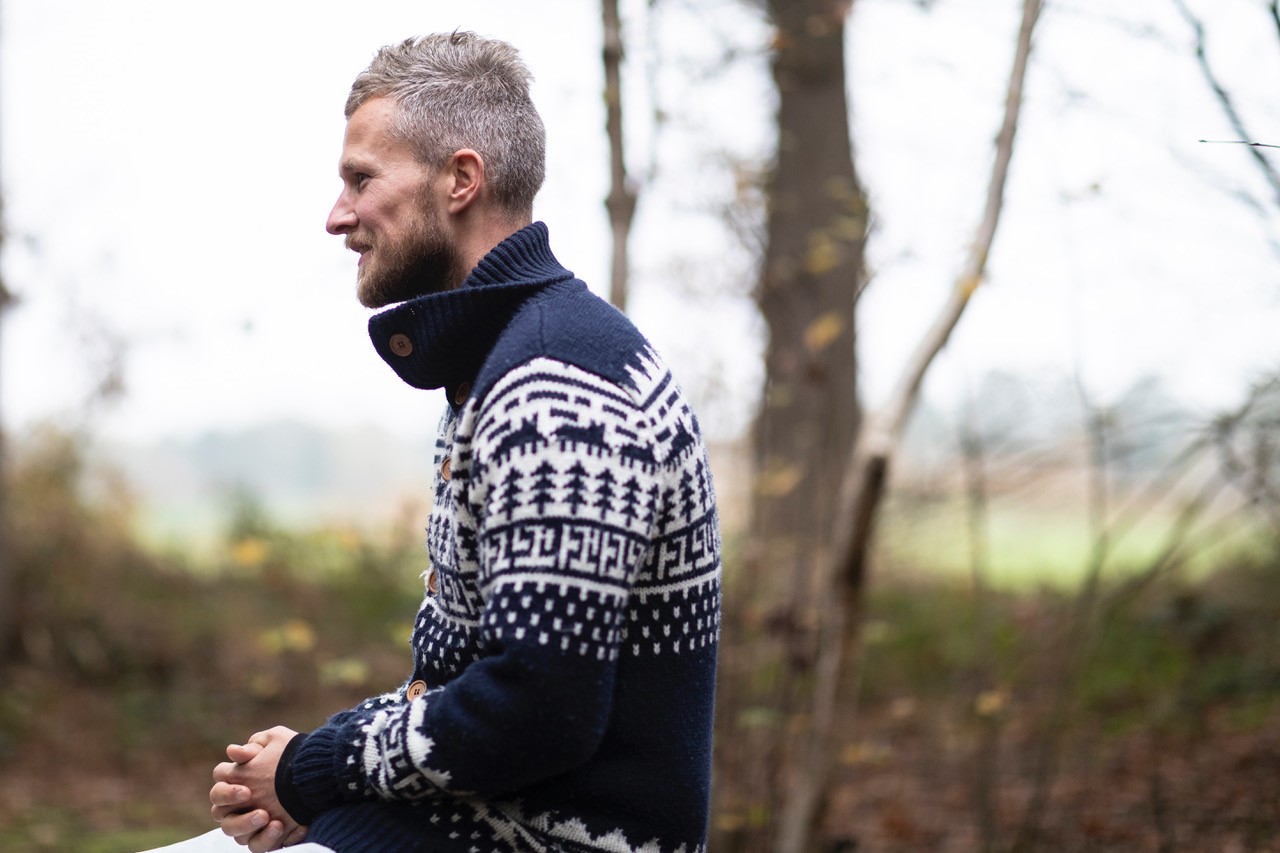
"The problem is not just the big companies who have set everything up, it’s also with us. If we need a new shirt, we buy eight."
"We just have to stop buying, but we have nothing to do so we are constantly looking to fill up that emptiness."
"Although the bigger collective goal – getting green – is there for the taking, we don’t embrace it massively."
"Everyone’s screaming that we need change, but few people are really doing something about it. They don’t feel the urge, but that will become clear by itself. The only question is when."
"We are way too comfortable here; when it’s not strawberry season, we still want strawberries. I suggest we eat what comes out of the soil here."
"We think we need to get everything out of life all the time."
"If you ask them about their hobbies, they don’t have time for them. While actually that hobby is maybe the answer to feeling better. "
"If everything can be destroyed in a day, everything can also be changed."
When did you decide to work less and focus on other things? “I didn’t want to work less, I wanted to work less for money. I liked the travel program I presented, but not presenting itself. Because of that, I wasn’t a good example for my kids. When they grow up I want them to do something that excites them, with the right intentions. If you have that mindset, you have to start with yourself.”
Many people see your previous job as the ideal one. Did that put pressure on you? “No, but funnily enough there are so many misconceptions about that kind of work. People working in the media don’t all live in Amsterdam and hang out in the same bars. Not all of them earn loads of money and get driven to work in a limousine. If a bookkeeper doesn’t enjoy his work anymore and starts to do something else, no one would be the wiser. In my case, there were people, also those close to me, who did not understand that I wanted to take distance from such an admired position. Being a presenter is a sort of holy grail, but I never saw my old work like that. A lot of people didn’t know that other things kept me busy during my time as a presenter, they never asked about it, it was always about the damn television. I found that so weird.”
